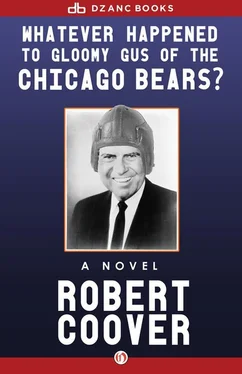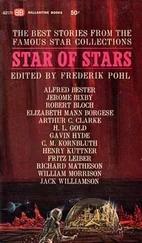Robert Coover - Whatever Happened to Gloomy Gus of the Chicago Bears?
Здесь есть возможность читать онлайн «Robert Coover - Whatever Happened to Gloomy Gus of the Chicago Bears?» весь текст электронной книги совершенно бесплатно (целиком полную версию без сокращений). В некоторых случаях можно слушать аудио, скачать через торрент в формате fb2 и присутствует краткое содержание. Год выпуска: 2014, Издательство: Dzanc Books, Жанр: Современная проза, на английском языке. Описание произведения, (предисловие) а так же отзывы посетителей доступны на портале библиотеки ЛибКат.
- Название:Whatever Happened to Gloomy Gus of the Chicago Bears?
- Автор:
- Издательство:Dzanc Books
- Жанр:
- Год:2014
- ISBN:нет данных
- Рейтинг книги:4 / 5. Голосов: 1
-
Избранное:Добавить в избранное
- Отзывы:
-
Ваша оценка:
- 80
- 1
- 2
- 3
- 4
- 5
Whatever Happened to Gloomy Gus of the Chicago Bears?: краткое содержание, описание и аннотация
Предлагаем к чтению аннотацию, описание, краткое содержание или предисловие (зависит от того, что написал сам автор книги «Whatever Happened to Gloomy Gus of the Chicago Bears?»). Если вы не нашли необходимую информацию о книге — напишите в комментариях, мы постараемся отыскать её.
Whatever Happened to Gloomy Gus of the Chicago Bears? — читать онлайн бесплатно полную книгу (весь текст) целиком
Ниже представлен текст книги, разбитый по страницам. Система сохранения места последней прочитанной страницы, позволяет с удобством читать онлайн бесплатно книгу «Whatever Happened to Gloomy Gus of the Chicago Bears?», без необходимости каждый раз заново искать на чём Вы остановились. Поставьте закладку, и сможете в любой момент перейти на страницу, на которой закончили чтение.
Интервал:
Закладка:
Robert Coover
Whatever Happened to Gloomy Gus of the Chicago Bears?
For Pili:
May there always be
one more anniversary…
It’s the Duke of Windsor’s wedding day. $1300 worth of flowers have arrived at their French château to “festoon the nuptials,” while back home in Baltimore, we’re told, Mrs. Simpson’s house is being reopened as a shrine and museum. EDWARD BOSSES WALLY AROUND AND SHE LIKES IT. She’s in fluted blue today with a bonnet of feathers and tulle. Elsewhere, another Soviet marshal is being shot, a young American is being guillotined in Fascist Germany for plotting against anti-Semites, a supposed has-been named Bill Dietrich pitched a no-hitter for the White Sox, and up in Wisconsin some guy dynamited his whole family just “because they wouldn’t help around the farm.” And here in Chicago Gloomy Gus is dead. I walk home from the county hospital, through the cool rain, up Ogden, thinking: Only for the egoist and the dogmatist (and maybe they’re one and the same, although I’m thinking of two different friends of mine) is there one “history” only. The rest of us live with the suspicion that there are as many histories as there are people and maybe a few more — out here in the flood, after all (I chuck the day-old Trib in a bin as I pass), what arrangements can we not imagine? Of course, we share some of the same information, call it that — Gus, for example, is dead in all our histories — but it’s never enough to call “History.” What do we have? Births, debts, deaths, and the weather.
Which as usual in Chicago is pretty grim. I’m getting soaked through, but to tell the truth, I don’t mind the rain — it’s been too hot, we all need the cooling off. It’s about the best news we’ve got, in fact, possibly excepting that of Mrs. Simpson’s festooned nuptials. I’m grateful just for the physical contact. Watching life vanish, even from a punch-drunk loony like Gloomy Gus, has a way of disconnecting me from things, and the cold wet wind blowing in off Lake Michigan, down Ogden’s diagonal swath and into my face, helps put my feet back on the streets again. I might even be able to go home and weld another piece on Maxim Gorky’s nose, I think. His nose is broad and generous: yes, maybe I can work again, why not? Gus is dead, Leo’s left town, Maxie is on his way to Spain, O.B. to New York, maybe I can clear the rest of those bums out of my studio and get some work done. I need to be cut off for a while, need to think out my half-formed plan to follow Maxie to Spain. If I could only finish the Gorky. Then I could go and die and feel less guilty about it.
Poor old Gus was the eleventh fatality from Sunday’s confrontation down at Republic Steel, most of them shot in the back; hundreds more were wounded and bashed, and now Kelly’s cops, not merely exonerated but eulogized for their wholesale shooting and clubbing of unarmed workers (okay, they weren’t all workers), have been given open license to hunt down all “agitators.” Which can mean just about anyone they and the strikebreaker gangs choose it to mean: RIOTS BLAMED ON RED CHIEFS. I suppose, in the general — and willful — confusion, that might even, ironically, include me. It’s Haymarket Square all over again, Chicago’s old conspiracy called law and order. Hystereotypical, man, as O.B. would say. Still, it’s not the ’20s, I shouldn’t let myself sink into Leo’s cynicism. Things are changing. It’s no longer a capital crime to belong to a union, and there’ve been real victories, most recently General Motors and Chrysler and U.S. Steel, Leo’s been part of them. The Wagner Act got past the Supreme Court just this past month, union organizers are guests of Congress, even the chaingangs have been put on forty-four-hour weeks, it’s a new world. Sure it is, I can hear him laugh sourly, but nudge the establishment, Meyer, and you can still get killed in it.
It was Leo who took Gus down to the Memorial Day demonstration Sunday. What had he intended? With Leo you could never be sure. Much less Gus, the poor freak. Whether he was trying to put on an entertainment for that cop, tackle him, or hump him, we’ll never know. Whichever, or all three, or something else, there’s no doubt he was caught offside once again and for the last time, his original sin. But he went down with real style and a complete disregard for his own skin, exemplifying a remark he once made to a sports reporter after a tough game: “A man is not afraid at a time like this because he blocks out any thought of fear by a conscious act of will. He concentrates entirely on the problem which faces him and forgets about himself.” Inarticulate as he was, where did Gus find these words? In books? From other interviews? Was he coached? Or maybe he didn’t say it, maybe some reporter made it up. As for the cop, when they told him it was the famous Chicago Bears halfback he’d shot, all he could do was stammer lamely that he was a Cubs fan.
There’s a line in Gorky’s My Universities: “I noticed — how many times? — that everything unusual and phantastical, however far from the truth it might be — appeals to people much more than serious stories of actual life.” Maybe this is because, in the end, the “phantastical” stories are easier to believe. Leo told me recently that one of the Syndicate’s booming operations these days is the supplying of weapons to both sides in industrial disputes: blackjacks, billyclubs, firearms, steel bars, baseball bats, charged wires, and steam lines, even ax handles never made for axes. He said that Republic Steel has bought ten times as many gas guns and twenty-five times as many gas shells and projectiles over the past three or four years as the whole city of Chicago, and claimed they recruit their scabs direct from the underworld. He was telling me this to explain why the union needed its own arsenal, whatever the source, its own army of volunteers. “Workers aren’t warriors,” he’s often said. “In armed conflict, you need some pros.” Not that the unions do much recruiting from the underworld, of course. “Those guys are instinctively reactionary, the boss-pool you might call them, you can’t trust them.” I’m sure the regret in his voice was sincere. And then that mustachioed grin: “Now, psychos, on the other hand…” I find it hard to cope with this realism. “As a socialist, Meyer,” Simon likes to say, “you’d make a good gardener.” This is true. I think of myself as a lyrical socialist, which makes about as much sense, given the world we live in, as being an anal-retentive anarchist with a bomb in his hand. Leo, it goes without saying, disappeared right after the riot. “If they ask where I am,” he told me on the phone, “tell them I’ve gone to Spain to get killed.” Which was not so much information as a dig at me. I supposed he was actually across the line somewhere on his way to one of Girdler’s other steel mills in Ohio or Michigan — Canton maybe, he might have been trying to give me a hint: mostly immigrant Spaniards there, after all, an unstable mix of anarchists and socialists with ties still to their suicidally warring movements back home in the Republic.
Spain’s a good place to go to get killed, all right, Leo’s right about that. Or mutilated: they say that three quarters of all the volunteers who’ve gone over there are already dead or wounded. Fascist propaganda maybe — but what would I do without my arms? or my eyes? Crossing the railroad line, I find myself for the first time in over a month crawling down by the tracks in what was once an old habit, scratching about in the light rain for iron spikes and nails lying loose. It wouldn’t be a surprise, I think, feeling the tenderness in my blackened eye like a word of advice, to find out that the Abraham Lincoln Battalion is being financed by rightwing industrialists in this country like Tom Girdler, happy to rid themselves once and for all of indigenous romantics.
Читать дальшеИнтервал:
Закладка:
Похожие книги на «Whatever Happened to Gloomy Gus of the Chicago Bears?»
Представляем Вашему вниманию похожие книги на «Whatever Happened to Gloomy Gus of the Chicago Bears?» списком для выбора. Мы отобрали схожую по названию и смыслу литературу в надежде предоставить читателям больше вариантов отыскать новые, интересные, ещё непрочитанные произведения.
Обсуждение, отзывы о книге «Whatever Happened to Gloomy Gus of the Chicago Bears?» и просто собственные мнения читателей. Оставьте ваши комментарии, напишите, что Вы думаете о произведении, его смысле или главных героях. Укажите что конкретно понравилось, а что нет, и почему Вы так считаете.












